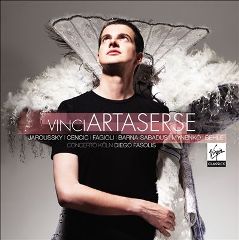Leonardo Vinci – Artaserse (Diego Fasolis) [2012]
Leonardo Vinci – Artaserse (Diego Fasolis) [2012]

1.Atto primo Sinfonia Rec.: Addio, Sentimi Arbace Aria: Conservati fedele Rec.: Figlio, Arbace. Signor Aria: Fra cento affanni Rec.: Coraggio o miei pensieri Aria: Su le sponde del torbido Lete Rec.: Qual vittima si svena! - Dove, principe, dove? Aria: Per pieta, bell'idol mio Rec.: Gran cose io temo Aria: Sogna il guerrier le schiere Rec.: Voi della Persia Aria: Bramar di perdere Rec.: Ah, Mandane... Artaserse - Signore. Amico Rec.: Artaserse respira Rec.: Arbace e il reo Aria: Deh respirar lasciatemi Rec.: E innocente dovrai traggi soffrir Aria: Non ti son padre Rec.: Ma per qual fallo mai Aria: Torna innocente e poi Rec.: Mio ben, mia vita... Aria: Dimmi che un empio sei Recitativo accompagnato: No che non ha Aria: Vo un mar crudele 2.Atto secondo Rec.: Dal carcere o custodi Aria: Rendimi il caro amico Rec.: Son quasi in porto Aria: Mi scacci sdegnato! Rec.: I tuoi deboli affetti - Figlia, e questi il tuo sposo Aria: Amalo e se al tuo sguardo Rec.: Ascolta o Megabise Aria: Non temer ch'io mai ti dica Rec.: Qual serie di sventure Aria: Se d'un amor tiranno Rec.: A qual di tanti mali Aria: Se del fiume altera l'onda Rec.: Mio re, chiedono a gara - Artaserse pieta - E vana la tua, la mia pieta Rec.: Tanto in odio alla Persia Aria: Per quel paterno amplesso Rec.: A pezzo del mio sangue Aria: Va' tra le selve ircane Rec.: Quanto, amata Semira Aria: Per quell'affetto Rec.: Dell'ingrata Semira Aria: Non conosco in tal momento Rec.: Son pur solo una volta Aria: Cosi stupisce e cade 3.Atto terzo Arioso: Perche tarda e mai la morte Rec.: Arbace. Oh dei, che miro! Aria: L'onda dal mar divisa Rec.: Quella fronte sicura e quel sembiante Aria: Nuvoletta opposta al sole Recitativo: Figlio, Arbace, ove sei? Aria: Ardito ti renda Rec.: Trovaste avversi dei Aria: Figlio se piu non vivi Rec.: Ne pur qui la ritrovo Duetto: Tu vuoi ch'io viva o cara Rec.: A voi popoli io m'offro Rec. accompagnato: 'Lucido dio per cui l'april fiorisce' Rec.: Al riparo signor - Ferma o germano Rec.: Ecco Arbace, o monarca, a' piedi tuoi Rec. accompagnato: 'Lucido dio per cui l'april fiorisce' Rec.: Ferma; e veleno Coro: Giusto re, la Persia adora Artaserse - Philippe Jaroussky (countertenor) Mandane - Max Emanuel Cencic (countertenor) Artabano - Daniel Behle (tenor) Arbace - Franco Fagioli (countertenor) Semira - Valer Bama-Sabadus (countertenor) Megabise - Yuriy Mynenko (countertenor) Concerto Köln Diego Fasolis – conductor 25.11.2012 Théâtre Municipal de Lausanne
The opera libretto Artaserse (Artaxerxes) by Pietro Metastasio was the hit of the 18th century opera seria. It was set more than 40 times, including once in English (by Thomas Arne), and its popularity lasted into the 19th century. The opera by Leonardo Vinci recorded here, however, was the very first one, dating from 1730. It's easy to see even at this late date why Metastasio's libretto appealed to opera composers and operagoers so much. The story, concerning the Persian king Xerxes' son Artaxerxes I (based very loosely on actual events), features royal pomp, young love, betrayal, tragic self-sacrifice, and, to top it all off, a happy ending. Musically the opera is odd by present-day standards; it called for an all-male cast, women being banned from Roman theaters at the time. The cast consisted of five castrati, sung here by countertenors, and one tenor, the villain Artabano. It's a big work, with sober processionals and spectacular arias for almost all the characters. French countertenor Philippe Jaroussky has never been in better voice, but the performance is equally notable for introducing some lesser-known countertenors, such as the creamy-voiced Valer Barna-Sabadus as Semira, Artaserse's frustrated lover. It's not until now, as a matter of fact, that a critical mass of countertenors has been available to perform music of this difficulty, and the results are worth hearing on several levels. Slowly but surely, the history of opera in the 18th century is being rewritten. ---James Manheim, Rovi
Leonardo Vinci, (born 1690, Strongoli, Kingdom of Naples [Italy]—died May 27, 1730, Naples), Italian composer who was one of the originators of the Neapolitan style of opera; along with Nicola Porpora, his followers included Giovanni Battista Pergolesi and Johann Adolph Hasse.
Vinci’s first known work was a comic opera in the Neapolitan dialect, Lo cecato fauzo (1719; “The False Blind Man”). He served as chapelmaster to the prince of Sansevero and in 1725 received a conductorship of the royal chapel at Naples, a post he held until his death. His earliest extant serious opera, Silla dittatore (1723; “Silla the Dictator”), inaugurated a series of about 40 operas, most written for Naples but some for Rome. Arias from his operas were published in London in 1758 under the title Collection of Songs. In addition to his operas, Vinci also composed oratorios, masses, and motets. --- britannica.com
download (mp3 @128 kbs):
uploaded yandex 4shared mediafire mega solidfiles zalivalka cloudmailru filecloudio oboom








